Dog blog 18 - Being Happy
Being Happy
There are 50 million results if you ask my friend, Mr Google, about "being happy". I suspect though that as you start to get beyond page 5, the results bear no resemblance to what you were really looking for.
Actually Dave (see, e.g., Dog Blog 17 - Semicolons) told me that last stat - which was totally made up. Interestingly, there was still interesting stuff (doubly interestingly, and now triply so) on page 5 of Mr Google's offerings: where, among other things, Michelle Obama suggests that you need to "give yourself permission" to be happy.
Happy thinky
There are 50 million results if you ask my friend, Mr Google, about "being happy". I suspect though that as you start to get beyond page 5, the results bear no resemblance to what you were really looking for.
Actually Dave (see, e.g., Dog Blog 17 - Semicolons) told me that last stat - which was totally made up. Interestingly, there was still interesting stuff (doubly interestingly, and now triply so) on page 5 of Mr Google's offerings: where, among other things, Michelle Obama suggests that you need to "give yourself permission" to be happy.
Happy thinky
Fellow Dog, Matthew Pianalto, had a thinky about some of this stuff. He points out that there are a number of different ways you might look at happiness: broadly psychological things that lead to happiness (going for a walk with a nice ball to chase, or a zen like state when chasing the ball) and the destination itself. The second bit is very tricky, at least for dogs like me and Dave. The Greeks had a go at thinking what the destination might be, and some of them came up with the idea of Eudaimonia. Which is about the idea of "human flourishing"; which might make you happy (like when Dave's pals Charlie and Mick were on the above day out at Lassie's house); or might be a result of you being happy.
A "state" of happiness
All that is a bit tricky. And fiddly. When Dogs start trying to talk about ideas involving emotions, like happiness, it can be quite hard to disentangle things like reasons why you might want to do something (e.g. chewing a dental bone stick is most probably going to be both fun and good for your teeth) and the state felt when actually doing the thing (e.g. a zen like state of chewing) from more abstract ideas like "human flourishing".
Having good teeth
Dave and I both like chewing our dental sticks, and it results in a state of canine canine flourishing. That is good for dogs, and we both have fun doing it.
But, this broader "state" of flourishing is more than just about me and Dave. And there's the rub: when you start to talk about psychologically motivated terms within a broader Dog community, you necessarily have to remove some of the individual emotion and experience from it: "flourishing" is a different experience for both me and Dave (as a matter of fact, Dave cracked one of his teeth on a real bone the other day, after eating a lot of ice cream).
In other words, "happiness" has different constituents within the broader community, the "state" of happiness. Which makes it a fairly slippery tool when used in that way for analysing ethical reasons why we might want to do something that results in this overall happy state (see for example one of the Dog's faves, Peter Singer, whose philosophy is based on that very idea): you have to compromise, and dilute.
If you were really clever, you might be able to attach different weightings to happiness through something like John Rawl's difference principle; but that is all too hard and tricky for me. And I'm not sure it would do much good: it's tricky enough trying to find out if Dave is really enjoying his dental stick or enjoying it nearly as much as me. I'm not sure what Lassie & Co pictured above would have made of it either.
Dog's breakfast
Having said all that, we were both quite cheery and quiet for about ten minutes while we did our chewings, so there's certainly a lot to be said for being happy. But how useful is it for saying more than that, or to draw meaningful big conclusions from it? Using it as an ethical tool or political tool brings other ideas into the mix, other constituencies; the overall "state" of happiness then becomes a hotchpotch of ideas and experiences.
Maybe then that's just a question of defining your terms. But that's my point: "happiness" is far too woolly on its own; a dog's breakfast of an idea: very nice to eat, but not always so nice to look at... .




Comments
Post a Comment